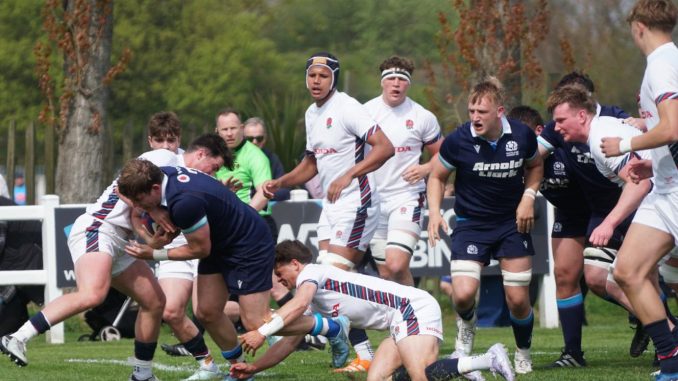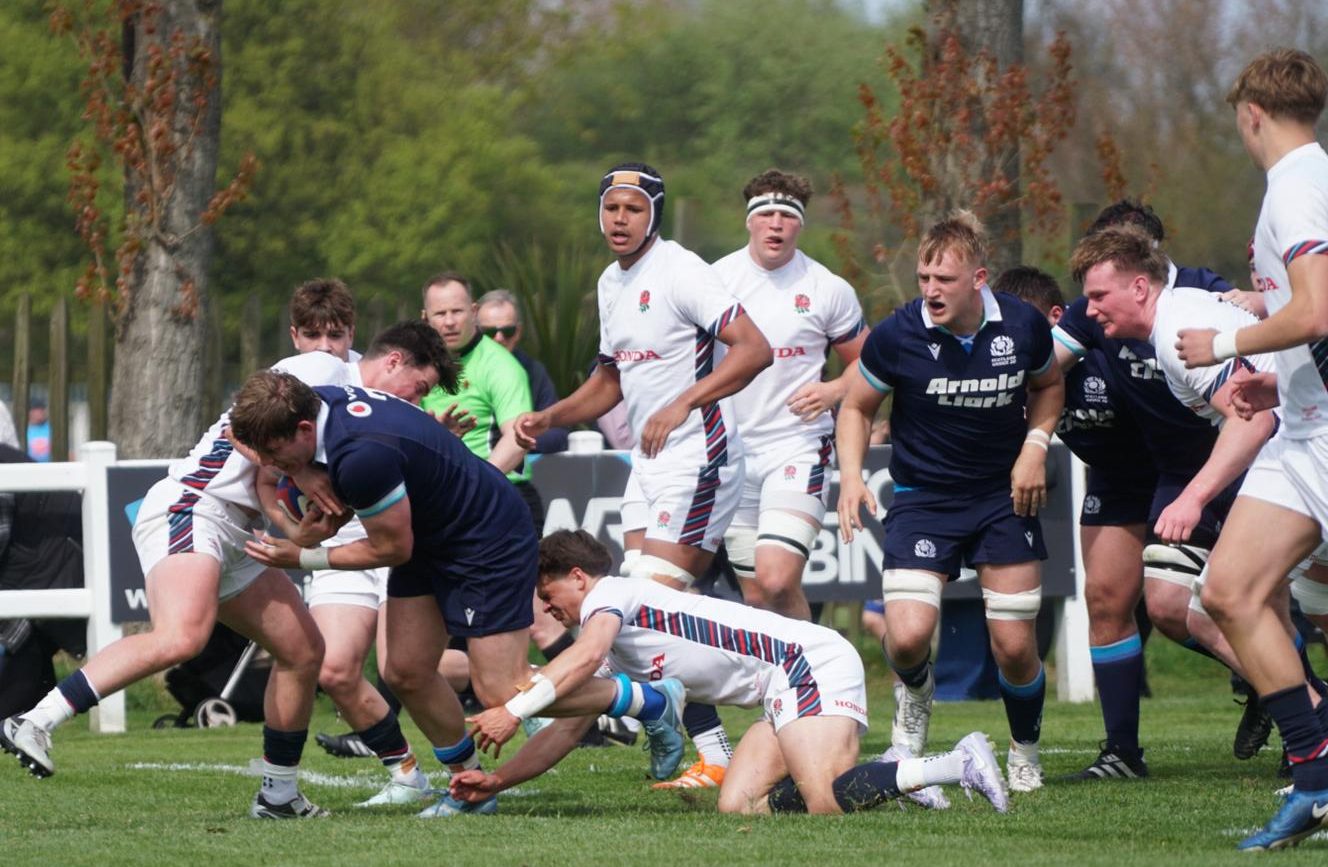 Scotland Under-19s suffered a heavy dfeat to England in a friendly at Percy Park. Image: Joe Anderson
Scotland Under-19s suffered a heavy dfeat to England in a friendly at Percy Park. Image: Joe Anderson 
ALAN LORIMER @ Percy Park RFC
THERE was a depressing familiarity to the scoreline in the friendly U19 international at Percy Park this [Saturday] afternoon where Scotland came up against an England side that had pace, power and skill in a try-hungry backline and a strong forward pack to provide a decent supply of ball.
Arguably Scotland did much better in the second half, matching England in a one try apiece scoreline for most of the post interval, only for the men in white to run in two quick scores in the final five minutes that distorted the true worth of the points distribution.
Scotland, however, can take pride from the way their forwards stood up to what looked a giant pack fielded by the home side. Not only did the Scots hold their own in the set-piece but actually earned two penalties from moving the England behemoths backwards. And in the touchline battle, Scotland were the equal of their opponents.
Arnold Clark Premiership Final: Ayr confirm top dog status with emphatic win over Watsonians
W6N: Scotland stun Ireland in frantic finale
URC: Edinburgh clinch a draw at the death against Zebre to breathe some life into play-off hopes
The visitors’ ability to match England in the scrum had not a little to do with the presence of Jamie Stewart at tighthead, who enhanced his reputation as a scrummager. Also catching the eye among the Scotland forwards were Rory Purvis at openside flank, Aiden Orr in the second-row and Logan Gray at No 8
The massive difference between the two teams was behind the scrum where England oozed both pace and talent, and, despite trenchant defence in midfield where the work of Alex Bryden was notable, the Scots were unable to stop some skilful tries, two at least of which came from aimless kicks.
England’s starting wings Noah Caluori and Sam Winters were simply outstanding, and in addition they had on their bench Tyler Offiah, the scion of rugby league royalty. No less a threat was centre Will Knight, who spear-headed the England attack against Scotland in the recent Six Nations U18 Festival in Italy. Furthermore, England were able to bring on from the bench their U18 stand-off Oscar Talbot, another to cause damage against Scotland in Italy early this month.
In terms of back play, Scotland were desperately unfortunate to lose their co-captain and stand-off Ross Wolfenden to injury early in the match, and without a recognised replacement for the pivot position the Scots had to bring on Freddie Drake Lee, the Swansea University inside centre.
Scotland also lost the services of full-back Harry Provan early in the game, but his replacement, Archie Barbour took the opportunity to remind the selectors of his presence with a reasonably encouraging performance, to back up his high approval ratings at his his club, Kelso. The other back to put in an assured performance was replacement scrum-half Hamish MacArthur, who added a dynamic dimension to the Scots’ play in the second half.
England’s ability to run in tries at will against Scotland was highlighted by Fergus Pringle the Scotland head coach. He said: “Unfortunately there were some soft tries. They found us too easy to score against. Mistakes and set-piece scores. But they have some real athletes in their backline. That’s something we have to address in Scotland. I thought we did well in the forwards. We put their scrum under pressure and we were able to maul against them.
“But overall some of their tries were just too soft. If you make a small mistake at this level there’s going to be a score against you. There were a couple of mistakes we made on the edges and they were so quick at capitalising”.
Pringle believes that both the England game and their Italy match at Melrose at the start of the month have been useful exercises.
“What it’s done is give a lot of guys exposure to this level and they understand now what is required if they want to play at this level. There’s plenty to go away and work on. We’ve seen some boys we didn’t know too much about. There are definitely boys here who will benefit from it,” concluded Pringle.
Scotland were under pressure from the whistle after coughing up ball from the kick-off and having consequently to defend for a lengthy period. In the event, Scotland’s defence held firm against repeated surges by the England forwards and was rewarded with a goal-line drop-out.
But when England ran a ball from their own half, centre Knight had the skills to escape along the left touchline to score the game’s opening try, converted by stand-off Ollie Davies. The England 10 then bagged a try after supporting a telling run by flying wing Caluori before adding the extra points to his own score.
Scotland were able to reply, however, with powerful forward play on the England line and then from a penalty created line-out they claimed a maul try for hooker and co-captain Joe Roberts converted by his fellow office holder Wolfenden.
Minutes later Wolfenden was forced to retire and England added a third score almost immediately. Once gain it was Caluori’s sheer pace that did the dramage, the Saracens wing sprinting clear to score in the corner. From the touchline, Davies showed his kicking skills off the tee with a third successful conversion.
Then it was the turn of opposite wing Winters to show his running threat after taking the ball from scrum-half Johnny Weimann and then chipping the Scotland defence to race in under the posts, Davies again converting
There was still time for a further England score before half time and it came via a solo effort from the powerful No 8 and skipper Connor Treacy, who thundered through several attempted tackles to notch up a fifth try for the men in white, the missed conversion by Davies leaving England ahead 33-7 at the break.
Having finished off the first half scoring, Treacey kept matters symmetric by touching down for the first try of the second half after England ran back a wayward Scottish kick. Davies once more converting to take his team to the 40 points mark.
Scotland came near to scoring when Stewart was put in the clear only for a posse of two white shirts to nail the big prop tantalisingly close to the line.
But when Jamie Thomson had room to make ground on the left wing it was the trigger for a second Scotland try, the ball transferred to the other wing for Nairn Moncrieff to touch down in the corner.
Scotland’s new-found confidence was quickly punctured when replacement wing James Pater fastened on to spilled ball before outpacing a despairing defence, replacement Talbot adding the extra points.
The England stand-off then rounded off a brief but convincing appearance by converting the game’s final try by Asa Stewart-Harris that gave the men in white a not unexpected sumptuous win.
Teams –
Scotland: H Provan; N Moncrieff, A Hunter, A Bryden, J Thomson; R Wolfenden, B Curtis; W Pearce, J Roberts, J Stewart, A Orr, D Halkon, A McMichael, R Purvis, L Gray. Subs: J Utterson, H Shearer, R Whitefield, A McCormack, F Ronnie, H McArthur, F Drake-Lee, A Barbour, M Rutherford, S Roberts, B Firth
England: C Byrne; N Caluori, R Beeckmans, W Knight, S Winter; O Davies, J Weimann; J Mann, J Staples, O Streeter, E Surrey, A Ainsworth-Cave, E Williams, P Hogg, C Treacey. Subs: G Knowles, J Miller, J Lightbown, L Griffiths, O Allport, G Marsh, A Stewart-Harris, O Talbot, J Pater, T Offiah.
Referee: Robbie Jenkinson (IRFU)
Scorers –
England: Tries Knight, Davies, Caluori, Winters, Treacey 2, Pater, Stewart-Harris; Cons: Davies 5, Talbot 2.
Scotland: Tries Roberts, Moncrieff; Con: Wolfenden.
Scoring Sequence (England first): 5-0; 7-0; 12-0; 14-0; 14-5; 14-7; 19-7; 21-7; 26-7; 28-7; 33-7 (h-t) 38-7; 40-7; 40-12; 45-12; 47-12; 52-12; 54-12.
Man-of-the-Match: England had Olympic level pace on the wings and used it to good effect but the controller in chief was stand-off Ollie Talbot who had an outstanding game in the pivot position as well as scoring a try and kicking five conversions for a 15 points contribution.
Talking point: As mentioned above, England’s performance was more about pace and athleticism than sheer beef, albeit they were not short of the latter. Scotland’s pack, however, should congratulate themselves for standing up to the force opposing them. But it is behind the scrum that Scotland were found wanting and in particular in that attribute of pace. That poses a challenge for Scottish rugby, of how to find pacey players and how to make those who are good rugby players significantly quicker. Size alone will not win at this level.



